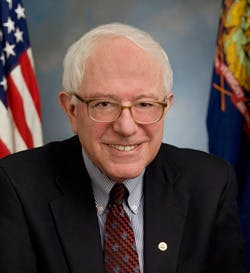A bill from Vermont
by Christine Nathe, RDH, MS
Senator Bernie Sanders from Vermont recently introduced a bill called The Comprehensive Dental Reform Act of 2013, a revised version of a similar bill from last year.1 A hearing was held that included testimony on the effectiveness of the dental therapists in Alaska, and the issues Americans have with accessing and paying for dental care in this country.
Sanders has stated that there is a national dental care crisis that is causing pain and suffering, and millions of dollars are wasted as people turn to hospital emergency rooms for care. The bill has specific areas of dental care, including coverage, access points, workforce, education, and research, which are depicted in the box. Of interest is the extended coverage for most Americans via the dental coverage expansion to all Medicare, Medicaid, and VA beneficiaries. Something of interest for dental hygienists is the increased funding for school-based dental services, and grants for coordination of care for patients accessing dental care in hospital emergency rooms. Additional workforce grants and funding for new demo programs, although not specifically written to include dental hygiene, could include dental hygiene midlevel programs.1
Coverage
This bill extends comprehensive dental health insurance to millions of Americans who do not have coverage today.
- Extends comprehensive coverage to all Medicare, Medicaid, and VA beneficiaries
- Makes dental services an essential health benefit for adults under the ACA
- Allows states to be eligible for an enhanced FMAP (15% increase) for dental services under Medicaid if they meet requirements to address provider participation and patient utilization
- Requires public reporting of states' Medicaid dental benefits and utilization
Access Points
This bill ensures that there are more places you and your family can go to access a qualified oral health-care professional to get the care you need.
- Increases funding for oral health services for health clinics, such as FQHCs
- Increases funding for school-based dental services
- Authorizes emergency room care coordination grants to enable individuals to receive dental care in clinics rather than in emergency room settings
- Authorizes funding for mobile and portable services and outreach to underserved populations
- Encourages the delivery of telehealth-enabled dental services
Workforce
This bill uses multiple strategies to increase the number of oral health professionals who will work in communities with the greatest need.
- Authorizes funding for additional National Health Service Corps scholarships and loan repayment to recruit and support oral health professionals to work in underserved communities
- Creates an oral health professional student loan program
- Authorizes additional funding for dental residencies in community health centers
- Incentivizes higher reimbursement rates for dental services to encourage greater provider participation in Medicaid
- Creates new demo programs for the training and employment of alternative dental health-care providers (Veterans Affairs, Department of Defense, Bureau of Prisons, Indian Health Service)
Education
This bill addresses the need to educate current and future oral health-care providers to better serve vulnerable populations and to integrate oral health care into overall health care.
- Authorizes additional funding for programs that educate nondental health professionals about oral health in order to encourage the integration of oral health care into overall health care
- Requires dental schools accepting any federal funding to meet criteria designed to prepare students to meet the needs of diverse and underserved populations
Research
This bill authorizes funding for research on prevention and disease management to improve oral health-care delivery and the oral health status of the country.
Authorizes additional federal funding for oral health research and evaluation related to the care and needs of underserved and vulnerable populations
The individuals who provided testimony promoted the dental therapy model that focused on the preventive and limited restorative dental care provided by therapists. The testimony also mentioned the fact that education for dental therapists is less expensive.
--------------------------------------------------------------------------------
Other articles by Nathe:
--------------------------------------------------------------------------------
Another potential solution could focus on a group of underutilized preventive dental providers, dental hygienists, who could easily be trained to advanced levels (depending on states' needs) to provide additional care to patients in strategic settings. The focus would still be preventive. The dental and dental hygiene associations could possibly collaborate regarding the additional services these advanced dental hygienists can provide. Determining which additional services are needed could be geared toward meeting the states' dental needs. The logical part of this solution is that we already have a cadre of underused providers. Also, they have the preventive and public health education to provide individual and population-based care. We need to continue reminding our elected officials that dental hygienists are available, in record numbers, to fill gaps in our dental care delivery system.
Overall, I think the ideas presented during the bill's introduction are a good first step in discussing dental care funding and delivery. These ideas place value on the oral health of our society. Truly, without increasing the public's value regarding oral health, no models will prove effective in meeting society's dental needs.
CHRISTINE NATHE, RDH, MS, is director at the University of New Mexico, Division of Dental Hygiene, in Albuquerque, N.M. She is also the author of "Dental Public Health Research" (www.pearsonhighered.com/educator), which is in its third edition with Pearson. She can be reached at [email protected] or (505)272-8147.
References
1. Via list-serve email: Erica Solway, Policy Advisor, Committee on Health, Education, Labor, and Pensions, Subcommittee on Primary Health and Aging, Chairman Bernie Sanders (I-VT), 424 Dirksen Senate Office Building, Phone: (202) 224-5480 | Fax: (202) 228-5044.
2. Senator Bernie Sanders – "The Comprehensive Dental Reform Act of 2013," 113th Congress.
Past RDH Issues

